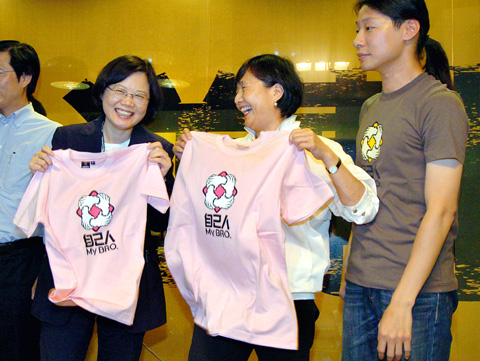The Democratic Progressive Party (DPP) will work to establish itself as a center-left party during its time in opposition, promoting wealth distribution, social justice and a comprehensive welfare system during the next four years, DPP Chairwoman Tsai Ing-wen (蔡英文) said yesterday.
Tsai — talking to members of the Taiwan Foreign Correspondents Club in Taipei — reiterated the message she has been delivering since taking over as party chair last month, saying the next four years were vitally important as the party needs to start again following its defeat in January’s legislative and March’s presidential elections.
Party unity was the most important aspect of the rebuilding, Tsai said, adding that a recent opinion poll had shown public perception of the DPP’s unity had increased dramatically.

PHOTO: LIAO CHEN-HUEI, TAIPEI TIMES
Asked about how the party would reconnect with grassroots voters and compete with the Chinese Nationalist Party’s (KMT) traditionally strong local organization networks, Tsai said the DPP would strive to increase direct contact with voters and would use former government officials to extend its grassroots movements.
Tsai said that although the party was strapped for cash, one thing it did have was a lot of time and it would use that time to re-energize its disappointed supporters.
On the issue of sovereignty, Tsai said that while it was important, it would not be the main focus for the party under her tenure. She said the DPP would remain firm but practical on the issue and accused the KMT government of giving away “too much, too fast” in the recent cross-strait talks with China, adding that a balance needed to be obtained.
Quizzed on whether she would lead opposition supporters to the streets if the new government failed to live up to expectations, she said that it was not her “style.”
She said that while the DPP wouldn’t tell people to protest, it would help organize things if that were the case.
Talking about the lack of stability and continuity in the DPP and the high turnover of party leaders in the past, Tsai said it was important for the DPP to experience a period of stability and emphasized she would not resign if the party performed poorly in next year’s local county commissioner and mayoral elections.

Alain Robert, known as the "French Spider-Man," praised Alex Honnold as exceptionally well-prepared after the US climber completed a free solo ascent of Taipei 101 yesterday. Robert said Honnold's ascent of the 508m-tall skyscraper in just more than one-and-a-half hours without using safety ropes or equipment was a remarkable achievement. "This is my life," he said in an interview conducted in French, adding that he liked the feeling of being "on the edge of danger." The 63-year-old Frenchman climbed Taipei 101 using ropes in December 2004, taking about four hours to reach the top. On a one-to-10 scale of difficulty, Robert said Taipei 101

Nipah virus infection is to be officially listed as a category 5 notifiable infectious disease in Taiwan in March, while clinical treatment guidelines are being formulated, the Centers for Disease Control (CDC) said yesterday. With Nipah infections being reported in other countries and considering its relatively high fatality rate, the centers on Jan. 16 announced that it would be listed as a notifiable infectious disease to bolster the nation’s systematic early warning system and increase public awareness, the CDC said. Bangladesh reported four fatal cases last year in separate districts, with three linked to raw date palm sap consumption, CDC Epidemic Intelligence

US climber Alex Honnold left Taiwan this morning a day after completing a free-solo ascent of Taipei 101, a feat that drew cheers from onlookers and gained widespread international attention. Honnold yesterday scaled the 101-story skyscraper without a rope or safety harness. The climb — the highest urban free-solo ascent ever attempted — took just more than 90 minutes and was streamed live on Netflix. It was covered by major international news outlets including CNN, the New York Times, the Guardian and the Wall Street Journal. As Honnold prepared to leave Taiwan today, he attracted a crowd when he and his wife, Sanni,

Taiwanese and US defense groups are collaborating to introduce deployable, semi-autonomous manufacturing systems for drones and components in a boost to the nation’s supply chain resilience. Taiwan’s G-Tech Optroelectronics Corp subsidiary GTOC and the US’ Aerkomm Inc on Friday announced an agreement with fellow US-based Firestorm Lab to adopt the latter’s xCell, a technology featuring 3D printers fitted in 6.1m container units. The systems enable aerial platforms and parts to be produced in high volumes from dispersed nodes capable of rapid redeployment, to minimize the risk of enemy strikes and to meet field requirements, they said. Firestorm chief technology officer Ian Muceus said